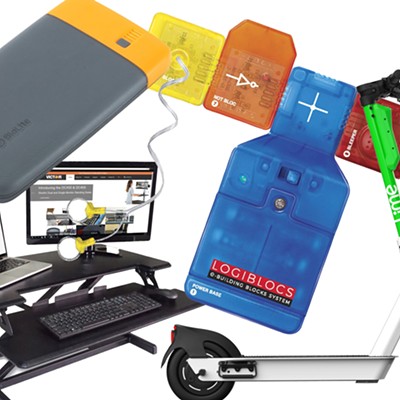A few months ago, I was confronted with an iPad while leaving a rural gas station bathroom.
"Satisfied with the cleanliness of this bathroom?" the screen asked.
Underneath the text, there were three buttons: a smiley face for "exceptional," a straight face for "average" and an unhappy face for "poor."
It felt a little silly. The bathroom was... fine? I honestly wasn't thinking about it at all, until I had to.
Touchscreen bathroom surveys are still rare, but they represent a growing trend: Sometime over the past decade, it became almost impossible to buy something without immediately being asked how you felt about it.
The food is still settling in my stomach when Domino's emails me to ask on a scale of one to 10 how likely I am to recommend their pizza to a friend. I buy a mattress, and receive four separate emails asking if I was satisfied with the delivery.
In a drive-thru, I'm told I can get a free small soda if I scan the QR code on the receipt and take five minutes to fill out a survey. The Mariners lose, as they do, but the team still reaches out after the game because they would just "love" to hear my "feedback on the fan experience at T-Mobile Park."
It's kind of exhausting.
"Tell us what you really think," says Amazon. "Tell us about your experience," says Apple. "Enjoying the app so far?" "How did we do?" "Your feedback is important to us."
Look, I get why businesses have to do this. It's important to know whether or not customers are actually happy. Surveys are fine in moderation. But the sheer scale of the quest for feedback feels untenable.
My alma mater, for example, has been bugging me for months now about some sort of alumni survey that will help the university "better meet the needs of future generations of students." It's a noble cause, but the survey takes 10 whole minutes.
In a decadelong quest to aggregate human emotions into data that can be crunched and touted at shareholder meetings, companies risk losing something fundamental and unknowable.
It's not enough to simply sit and enjoy your purchase anymore — you must contend with yet another notification, and attempt to quantify how "satisfied" you felt while buying an Ikea table or whatever. Everyone becomes a critic. The default emotion is judgment.
There's also the more nebulous question of what companies actually do with the data they collect. If enough people press the unhappy face while leaving the gas station bathroom, will the janitor hear about it? Will their quarterly bonus be lower?
It's been common knowledge for years that Uber drivers and other gig workers risk deactivation if their rating dips below four stars. Precariously employed professors risk being denied tenure if their quarterly teacher evaluations are too low. Do we really want people's livelihoods tied to the whims of a 19-year-old freshman pissed about getting a D- on a college essay?
The deluge of customer satisfaction surveys is only a small part of a larger cultural shift toward metrics and reviewing everything. Think about the iPad tip screens at coffee shops, the "like" button on social media, and the Google reviews that small businesses live or die by. Together, the numbers are supposed to mean something — but what? Will more data ever set us free? Who says the customer is always right?
We should note that the Inlander strives to inform readers with interesting and insightful writing. Feel free to reach out to [email protected] to let us know on a scale of one to 10 how satisfied you felt while reading this essay. ♦



























